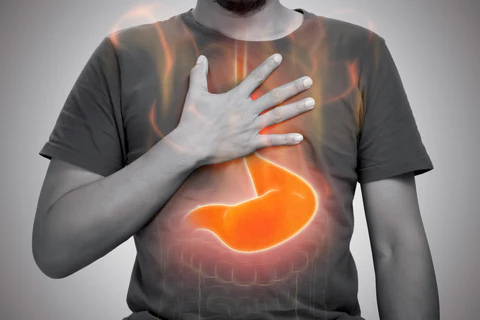Heartburn is a common and uncomfortable condition that many people experience. Characterized by a burning sensation in the chest, heartburn can significantly disrupt daily activities and reduce overall quality of life. Fortunately, heartburn is often manageable through simple lifestyle changes. By making informed choices about your diet, habits, and overall lifestyle, you can reduce the frequency and severity of heartburn. In this blog, we’ll explore practical advice for managing heartburn, including dietary tips, lifestyle modifications, and the role of medicine, including the convenience of obtaining online medicines.
Understanding Heartburn
Heartburn occurs when stomach acid flows back into the oesophagus, causing a burning sensation in the chest. This is often due to the lower oesophagal sphincter (LES) not closing properly or opening too frequently. Several factors can trigger or exacerbate heartburn, including certain foods, eating habits, and lifestyle choices.
Common Causes of Heartburn
- Dietary Choices: Spicy, fatty, or acidic foods can trigger heartburn. Common culprits include citrus fruits, tomatoes, chocolate, and caffeinated beverages.
- Eating Habits: Eating large meals or lying down immediately after eating can cause heartburn.
- Lifestyle Factors: Smoking, excessive alcohol consumption, and stress can increase the risk of heartburn.
- Medical Conditions: Obesity, pregnancy, and certain medical conditions like hiatal hernia can contribute to acid reflux.
- Medications: Some medications, including certain pain relievers, muscle relaxers, and blood pressure medications, can cause or worsen heartburn.
Practical Lifestyle Changes to Manage Heartburn
1. Modify Your Diet
- Avoid Trigger Foods: Identify and eliminate foods that trigger your heartburn. Common triggers include spicy foods, citrus fruits, tomatoes, chocolate, and caffeine.
- Eat Smaller Meals: Opt for smaller, more frequent meals instead of large ones to prevent the stomach from becoming too full.
- Stay Upright After Eating: Avoid lying down immediately after meals. Wait at least two to three hours before reclining.
2. Adopt Healthy Eating Habits
- Chew Slowly and Thoroughly: Take your time eating and chew your food thoroughly to aid digestion.
- Avoid Eating Late at Night: Try to have your last meal at least three hours before bedtime to reduce the risk of nighttime heartburn.
3. Make Lifestyle Modifications
- Maintain a Healthy Weight: Excess weight can put pressure on your abdomen, pushing up your stomach and causing acid to back up into your oesophagus.
- Quit Smoking: Smoking can weaken the LES, leading to acid reflux. Seek help to quit smoking if necessary.
- Limit Alcohol Intake: Reduce or eliminate alcohol consumption, as it can relax the LES and trigger heartburn.
- Manage Stress: Practice stress-reducing techniques such as meditation, yoga, or deep breathing exercises to help prevent stress-induced heartburn.
4. Stay Hydrated
Drinking plenty of water helps maintain blood volume and allows your heart to pump more efficiently. Aim for at least eight glasses of water a day.
5. Get Enough Sleep
Ensure you get 7-9 hours of quality sleep each night. Poor sleep can increase the risk of heart disease and negatively impact overall health.
6. Limit Salt Intake
Excessive salt can raise blood pressure, leading to heart disease. Opt for herbs and spices to flavour your food instead of salt, and avoid processed foods high in sodium.
Medications and Online Medicines
While lifestyle changes are crucial for managing heartburn, medications can also provide relief, especially for those with chronic or severe symptoms. It’s essential to consult with a healthcare professional to determine the best treatment options for you. Pharmacies and online medicine apps play a critical role in providing these medications and offering advice on their use.
Over-the-Counter Medications
- Antacids: These can provide quick relief by neutralizing stomach acid. Examples include Tums, Rolaids, and Maalox.
- H2 Blockers: These reduce the amount of acid your stomach produces. Examples include ranitidine (Zantac) and famotidine (Pepcid).
- Proton Pump Inhibitors (PPIs): These are more potent acid reducers that help heal the oesophagus. Examples include omeprazole (Prilosec) and lansoprazole (Prevacid).
Prescription Medications
For more severe cases of heartburn or GERD, a healthcare provider may prescribe stronger medications or higher doses of over-the-counter medications. Prescription options include:
- Stronger PPIs: Higher doses of PPIs may be prescribed for severe symptoms.
- Prokinetics: These help your stomach empty faster and strengthen the LES.
With the convenience of online pharmacies, you can easily order your medications from the comfort of your home. Online medicine services offer a wide range of options, including generic medications, and often provide additional resources and information to help manage your condition effectively.
Takeaway
Heartburn can be a disruptive and uncomfortable condition, but with the right lifestyle changes and treatments, you can manage it effectively. By modifying your diet, adopting healthy eating habits, making lifestyle changes, and using appropriate medications, you can significantly reduce the frequency and severity of heartburn. Always consult with healthcare professionals and take advantage of the resources available at your local pharmacy and through online medicine delivery apps to ensure you’re making the best choices for your health.
Taking proactive steps to manage heartburn not only improves your quality of life but also contributes to your overall well-being. Start incorporating these heartburn solutions today and enjoy a healthier, more comfortable life.


